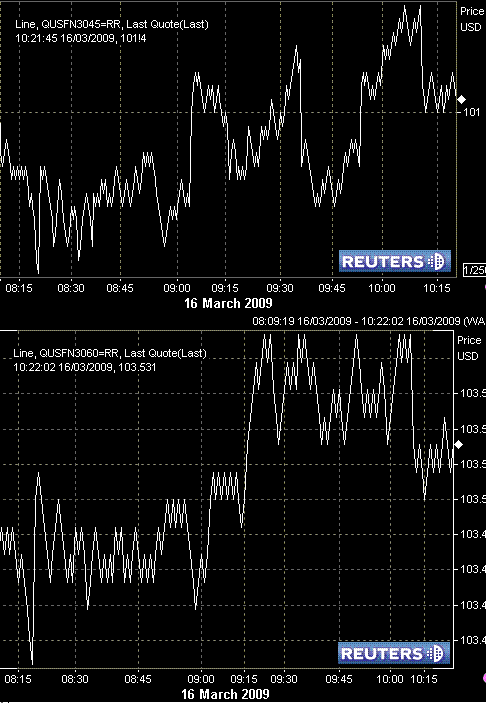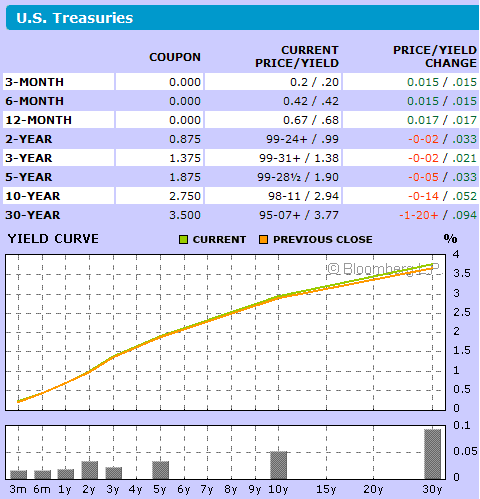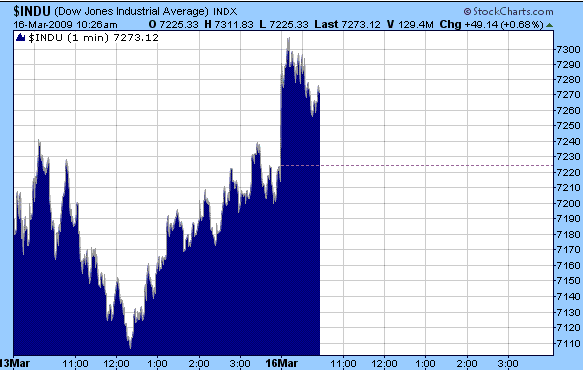After an early morning lack of activity which led MBS prices lower, the stack is heading in the opposite direction of the steepening yield curve.
The current price level of mortgages encourages profit taking and a general lack of interest in available for bid commitments of newly issued MBS. Over the past week the MBS market decided it was safe to move "up in coupon" given the full implementation of Fannie and Freddie refinance and loan modification programs is not expected to be MBS effective until May delivery.
On the bright side the Fed remains more than willing to soak up excess originator supply of MBS (when you lock your loans the Fed is end buyer). Continued Fed support alleviates some mortgage banker stress, however until MBS price levels fall a few ticks, originator supply selling will remain a culprit for "reprice for the worse" notifications.This implies periods of aggressive pricing will not last long. Investor pricing strategies should remain erratic and will often defy logic.
APRIL FN30______________________________
FN 4.0 -------->>>> -0-02 to 99-02 from 99-04
FN 4.5 -------->>>> -0-02 to 101-01 from 101-03
FN 5.0 -------->>>> +0-01 to 102-10 from 102-09
FN 5.5 -------->>>> +0-01 to 102-31 from 102-30
FN 6.0 -------->>>> +0-00 to 103-18 from 103-18
MBS is outperforming TSYs this morning....


Stocks are moving higher early in the session after Barclay's released a statement indicating hopeful 1Q 2009 earnings. This announcement follows similar rhetoric released by Citibank and Bank of America last week. Stocks indexes are trading off 12 year lows, however much remains unknown in regards to the health of the economy and financial system as a whole. Much media attention will be placed on the release of more details from the Treasury Department regarding a proposal for a public-private partnership to remove toxic assets from bank balance sheets. The statement provided will serve to steer markets in a new direction or add momentum to the current rally in equity markets.

Over the weekend Federal Reserve Chairman Ben Bernanke appeared on 60 minutes. In his interview he suggested that the economy could remain in recession for the remainder of the year and warned that the biggest risk to recovery was the government's inability to develop an effective means of removing bad mortgage assets from balance sheets.
Last Wednesday, Financial Accounting Standards Board Chairman Robert Herz testified before the House Subcommittee on Capital Markets, Insurance, and GSEs. During the questioning period Chairman Herz was repeatedly pressured to expedite the FASB's guidance on mark to market. Here are a few statements from Chairman Herz...
"The fact that fair value measures have been difficult to determine for some illiquid instruments is not a cause of current problems but rather a symptom of the many problems that have contributed to the global crisis-- including lax and fraudulent lending, excess leverage, the creation of complex and risky investments through securitization and derivatives, the global distribution of such investments across rapidly growing unregulated and opaque markets lacking a proper infrastructure for clearing mechanisms and price discovery, faulty ratings, and the absence of appropriate risk management and valuation processes at many financial institutions,"
"While bending the rules to favor a particular outcome may seem attractive to some in the short run, in the long run, a biased accounting standard is harmful to investors, creditors and the U.S. economy"
The full text of Chairman Herz testimony is HERE
Mortgage Rates are mixed this morning. In general most lenders that have published rates are close to where they were priced on Friday.





